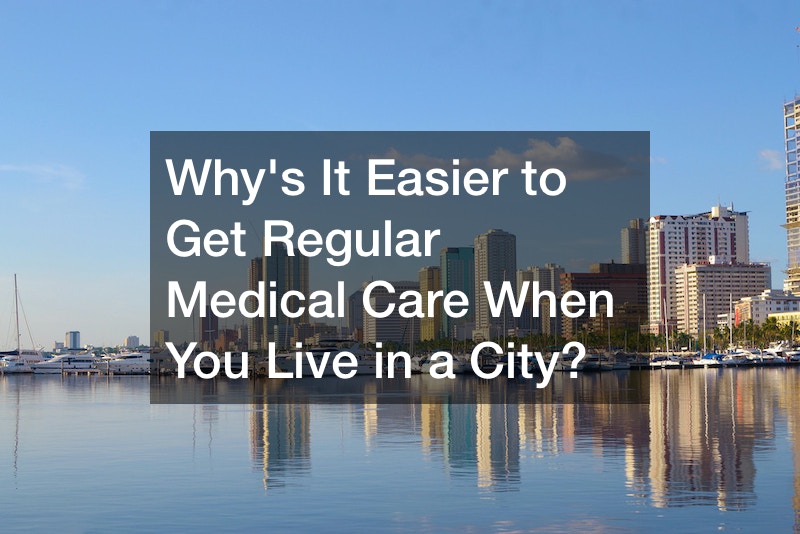When it comes time to get regular medical care, the adage ‘location, location, location’ rings particularly true. It’s no secret that city dwellers often have the upper hand over their rural counterparts in terms of access and convenience. The reasons? Well, there are a lot of factors that interplay in a complex topic.
City life, with its hustle and bustle, isn’t just about coffee shops on every corner and 24/7 conveniences. It’s also about having a hospital within a stone’s throw, a pharmacy open round the clock, and clinics offering after-hour services. Cities, with their dense populations and compact spaces, are a magnet for a wide array of healthcare facilities, specialists, and medical services. Let’s delve a little deeper and explore why, if you’re living in the city, it’s often easier to get regular medical care.
Accessibility to Specialized Medical Services

Living in a city doesn’t just make it easier to get regular medical care; it’s also a boon for those needing specialized medical services. Say you’ve been dealing with chronic pain and need a pain clinic, or you’ve been experiencing knee issues and need to see a knee doctor. In the city, you’re likely to find these specialized services without much hassle.
Cities are bursting at the seams with a variety of specialized medical services. It’s not unusual to find different types of clinics in the same block or just a short drive away. This proximity means that city dwellers can easily access specialized care whenever they need it.
What’s more, having these specialized services nearby also means you’re more likely to keep up with regular appointments. It’s one thing to know you should see a specialist; it’s another thing entirely to make it to those appointments. City living makes it easier to access medical care, not just for common ailments but for specialized conditions, too.
If you’re dealing with a complicated health issue that requires seeing a specialist or if you’re simply looking to maintain your health with regular check-ups, city living could be just what the doctor ordered.
Advanced Medical Infrastructure
One cannot discuss the benefits of city living without mentioning the advanced medical infrastructure often found in these urban cities. The cityscape is not just about towering skyscrapers and bustling streets; it’s also home to state-of-the-art medical facilities born out of advanced medical office construction. These facilities aren’t simply buildings; they’re finely tuned, well-oiled machines designed to provide the best possible care.
Construction of medical offices in the city is typically high-tech and eco-friendly, often incorporating cutting-edge designs that facilitate an optimal healing environment. This isn’t just about having a pretty facade but about creating spaces that enhance patient care and experience. From clinics to large hospitals, these facilities are designed to ensure you can get regular medical care with ease and efficiency.
Furthermore, these modern facilities are equipped with the latest medical technologies, providing a level of care that is hard to beat. Whether you need a routine check-up or require specialized medical services, these advanced medical infrastructures have got you covered.
Of course, it’s not just about the facilities themselves but also about the people within them. Cities attract top-notch medical professionals, drawn not just by the advanced facilities but also by the opportunities for growth and development. So, when you step into a city’s medical office, you’re not just getting access to advanced infrastructure but also a team of dedicated professionals ready to provide exceptional care.
Comprehensive Treatment Options

One of the most valuable attributes of these medical infrastructures is their ability to provide comprehensive treatment options. With a focus on both traditional and innovative therapies, patients can rest assured that they have access to the best possible care. One such treatment is hormone replacement therapy. It’s a revolutionary approach that uses medications containing hormones to replace those missing in your body. It’s often used to treat common symptoms of menopause and other hormonal imbalances.
The majority of medical infrastructures also have a clinic for regenerative medicine. It’s an exciting, relatively new field that uses the body’s cells to heal and regenerate damaged tissues and organs. It’s a cutting-edge treatment option that’s showing promise in dealing with a wide array of conditions.
Moreover, these city-based medical offices make it easy for you to get regular medical care. Whether you need a simple check-up, a series of tests, or a long-term treatment plan, these facilities have got you covered. They’re not just equipped with the latest medical technology; they’re also staffed by highly skilled professionals who are dedicated to providing the best possible care.
The Role of Aesthetic and Dermatological Care
Aesthetic and dermatological care plays a crucial role in our overall well-being. It is not just about achieving a look that makes you feel good about yourself; it goes far beyond that. While we can’t deny the boost in confidence when we look our best, it is also paramount to remember that a cosmetic dermatologist can play a significant role in alleviating more serious skin conditions. They’re not just there for the beauty aspect – they’re also there to help maintain and improve your skin’s health.
Their services often blend seamlessly with the need to get regular medical care. Just as you would routinely visit a dentist for your oral health or have an annual physical examination, it’s equally important to have regular dermatological check-ups. These visits may help identify potential problems early on, allowing for more effective treatment and, ultimately, better outcomes.
There are lots of dermatological conditions that require attention, from acne and eczema to melanomas and even rare skin diseases. Having a dermatologist on your healthcare team adds an additional layer of care, especially one that focuses on the largest organ in our body – our skin.
Additionally, the field of cosmetic dermatology continually evolves, with new treatments and technologies regularly being introduced. This offers patients an extensive range of options, whether they’re looking for preventative skincare routines, solutions to specific dermatological issues, or simply ways to feel more comfortable in their own skin.
The integration of aesthetic and dermatological care in our regular health regime is more than skin-deep. It’s an essential aspect that contributes to our total health, enhancing not just our physical appearance but also our overall quality of life.
Mental Health Support in Urban Areas

It’s a well-known fact that city living, while full of opportunities and amenities, can sometimes take a toll on our mental health. The fast-paced lifestyle, the hustle and bustle, and the pressure to keep up can lead to stress, anxiety, and other mental health issues. Fortunately, urban areas often have robust mental health support systems in place to help those in need.
One of the key aspects of this support is mental health medication management. This is a specialized service to help individuals maintain their mental wellness by ensuring they take their medications correctly and consistently. It’s an essential part of a holistic mental health care approach, working hand-in-hand with therapy and counseling.
A crucial practice in managing mental health is to get regular medical care. Routine check-ups allow professionals to monitor your health and detect any changes early. It’s important for everyone, but especially for those living in urban areas, to take advantage of these resources. Regular care can help manage the effects of city living on mental health and provide the best possible quality of life.
But let’s not forget that mental health care also goes beyond just regular check-ups and medication management. Urban areas often have a variety of support systems, such as support groups, counseling services, and mental health awareness events. These resources not only provide help but also work to eliminate the stigma associated with mental health issues.
Employment Opportunities in Urban Healthcare
In the realm of urban healthcare, a wealth of employment opportunities abound for those with a knack for care and healing. One such promising avenue is physiatry physician employment. For those unfamiliar with the term, ‘physiatry’ refers to a branch of medicine focused on the physical rehabilitation and management of diseases that affect the nerves, muscles, and bones.
Physiatrists play a pivotal role in the urban healthcare landscape. They are highly sought-after for their expertise in enhancing and restoring functional ability and quality of life among those with physical impairments or disabilities. With the cityscape often teeming with individuals in need of specialized care, a physiatrist’s role is indeed indispensable.
However, becoming a physiatrist is not the only way to make an impact. Urban healthcare offers a myriad of other roles, from nursing and social work to administration and policy development. Regardless of the specific job title, the common denominator is the call to ‘get regular medical care’ to those who need it most.
Securing steady employment in urban healthcare is not just about landing a job, but it’s also about making a difference. You’re not merely clocking in and out; you’re offering a lifeline and improving the quality of life for countless individuals. If you’ve ever considered a career in healthcare, think about the potential impact you could make in an urban setting.
Legal Aspects of Healthcare in Urban Settings

In the bustling hive of urban settings, healthcare doesn’t exist in isolation — it’s interconnected with several other sectors, among which law occupies a significant position. One particular segment of law that’s closely tied to urban healthcare is personal injury law. It’s often the case that for many city-dwellers, personal injury law offices play a crucial role in their healthcare journey.
For instance, let’s consider the scenario where someone suffers an injury due to another’s negligence — maybe a vehicle collision on the ever-busy city streets or a slip and fall at a public place. In such cases, a personal injury law firm steps in to ensure that the victim’s rights are upheld and that they’re adequately compensated for medical expenses, lost wages, and other related costs. This legal support can be instrumental in allowing the individual to get the regular medical care they require for recovery.
However, the integration of law and healthcare goes beyond personal injury cases. Legal aspects permeate into healthcare policy development, regulatory compliance, patient rights, and privacy, and even into areas like urban planning and safety to prevent injuries and promote public health.
In essence, the legal framework serves as the backbone, ensuring the smooth operation of the urban healthcare system, setting guidelines for medical practice, and even shaping the ethical landscape of healthcare service provision. It’s a symbiosis where law and healthcare intertwine, each shaping and supporting the other.
Challenges and Solutions in Urban Healthcare
Urban healthcare isn’t without its challenges. One of the most prevailing issues is accessibility. Despite being in a densely populated area, many city dwellers struggle to get regular medical care due to factors like overcrowded facilities, long waiting times, and high costs. Another challenge is the lack of personalized care. With the demand so high, healthcare providers often don’t have the time to give individual attention to each patient, affecting the overall quality of care.
However, it’s not all doom and gloom. Solutions are emerging to combat these challenges. Telemedicine, for instance, is rapidly becoming a way for patients to receive medical attention without the need to physically visit a healthcare facility. This not only reduces the pressure on healthcare facilities but also cuts down waiting times. On the personalization front, AI and data analytics are helping healthcare providers understand patient needs and preferences better, leading to more personalized care.
In essence, while urban healthcare has its fair share of challenges, the intersection of technology, policy, and innovative thinking is paving the way for more accessible, effective, and personalized medical care in cities.
City living provides unmatched access to medical care, specialized services, and advanced infrastructure, enhancing the health of urban residents. The availability of diverse healthcare options, from state-of-the-art facilities to specialized professionals, emphasizes the importance of location. As urban landscapes evolve, they offer convenience and a robust support system for health. City dwellers should get regular medical care to take advantage of these opportunities.





